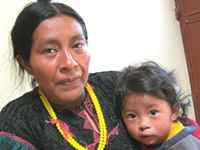
Santos has a cleft lip, which means the two sides of his upper lip physically split at birth. Catarina talked with Sister Barbara about her son, and right then and there in rural Guatemala, Santos’ life was about to change.
Some people turn their heads at the sight of a child with a cleft lip. “Clefted” kids have trouble speaking and eating. Many are told not to come to school or play with other children because of their disfigured faces. They are lovable just the same.
Who would sustain a growing baby if not his own mom? For Santos, it’s been a long road to recovery. He’s not even 2, and he’s had five trips to the hospital to correct his cleft lip.
Santos is not alone. More children are born with cleft lips in developing countries. In places like Guatemala, indigenous women often lack proper nutrients during pregnancy.
“Through education, their diet improves somewhat,” Sister Barbara said, “but is limited because of a lack of availability and poverty.”
San Andres Apostle parish has been especially hard hit. When the church pastor baptized several children with cleft lips, all within only a few months, Sister Barbara knew that something had to be done.
The good news is that cleft lips and other birth defects can be prevented. In basic education classes for rural women here, Sister Barbara suggests the best foods to eat when a baby is on the way. She recommends foods high in folic acid: leafy green vegetables like spinach, broccoli and asparagus.
In a place like Guatemala where nearly everyone struggles to have enough food to eat, we can make a difference.
